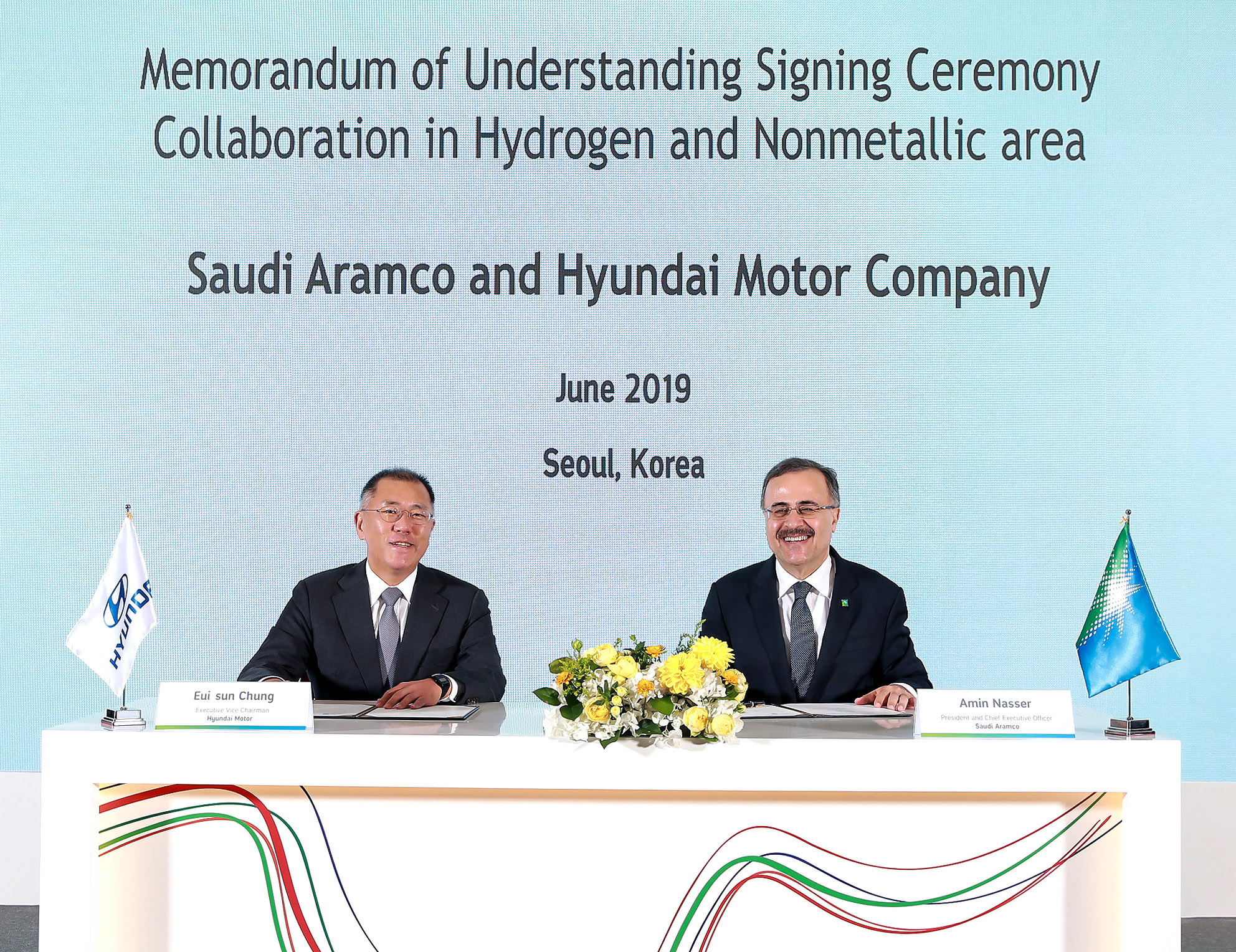Hyundai Motor and Saudi Aramco to collaborate on Hydrogen, advanced non-metallic materials and future technologies
; Date: June 26, 2019
Tags: Hyundai Motor Group »»»» Fuel Cell Vehicles »»»» Hydrogen Economy

- New agreement to expand hydrogen ecosystem in South Korea and Saudi Arabia
- Collaboration includes R&D into widespread use of non-metallic materials
- Hyundai and Aramco cooperation to explore future automotive businesses and technologies
SEOUL, June 26, 2019 – Hyundai Motor Company signed a memorandum of understanding (MOU) with Saudi Arabian Oil Company (Saudi Aramco). The MOU provides a framework to accelerate expansion of a hydrogen ecosystem in the Korean and Saudi Arabian markets, and to explore the use of advanced non-metallic materials in various fields including the automotive industry.
In addition to collaborating on hydrogen supply and the deployment of hydrogen refueling stations in Korea, Hyundai Motor and Saudi Aramco will grow awareness of Hyundai’s hydrogen fuel cell vehicles in the Kingdom of Saudi Arabia. The companies will also team-up to expand the adoption of non-metallic materials across a wide range of applications, including the use of carbon fiber and carbon fiber-reinforced plastic. Additionally, the companies will cooperate on the development of future automotive technologies.
“The collaboration of Hyundai Motor and Saudi Aramco will accelerate progress toward a hydrogen society by expanding access to a robust hydrogen infrastructure and fuel-cell electric vehicles,” said Euisun Chung, Executive Vice Chairman (EVC) of Hyundai Motor Company. “Both businesses are leaders in the hydrogen value-chain, and our collaboration will support global action for a better, more sustainable future, while exploring future automotive businesses and technologies”
According to the International Energy Agency’s recently released report during the G20 Energy and Environment Ministerial meeting in Japan, hydrogen is currently enjoying unprecedented political and business momentum, with the number of policies and projects around the world expanding rapidly. It concludes that now is the time to scale up technologies and bring down costs to allow hydrogen to become widely used.
At an exclusive investor event held on the day ahead of the G20 Ministerial meeting, EVC Chung shared the company’s belief that a ‘hydrogen-powered society’ is the most viable solution to a successful energy transition. In turn, the company has made important steps toward a hydrogen society lead by its commitment to sustainable transportation, as part of its FCEV Vision 2030. The vision aims to create a worldwide hydrogen society that leverages hydrogen technologies beyond the transportation sector.
About Hyundai Motor
Established in 1967, Hyundai Motor Company is committed to becoming a lifetime partner in automobiles and beyond with its range of world-class vehicles and mobility services available in more than 200 countries. Employing more than 110,000 employees worldwide, Hyundai has sold more than 4.5 million vehicles globally. Hyundai Motor continues to enhance its product line-up with vehicles that are helping to build solutions for a more sustainable future, such as NEXO, the world’s first dedicated hydrogen-powered SUV.
More information about Hyundai Motor and its products can be found at: http://worldwide.hyundai.com or http://globalpr.hyundai.com
Disclaimer: Hyundai Motor Company believes the information contained herein to be accurate at the time of release. However, the company may upload new or updated information if required and assumes that it is not liable for the accuracy of any information interpreted and used by the reader.

